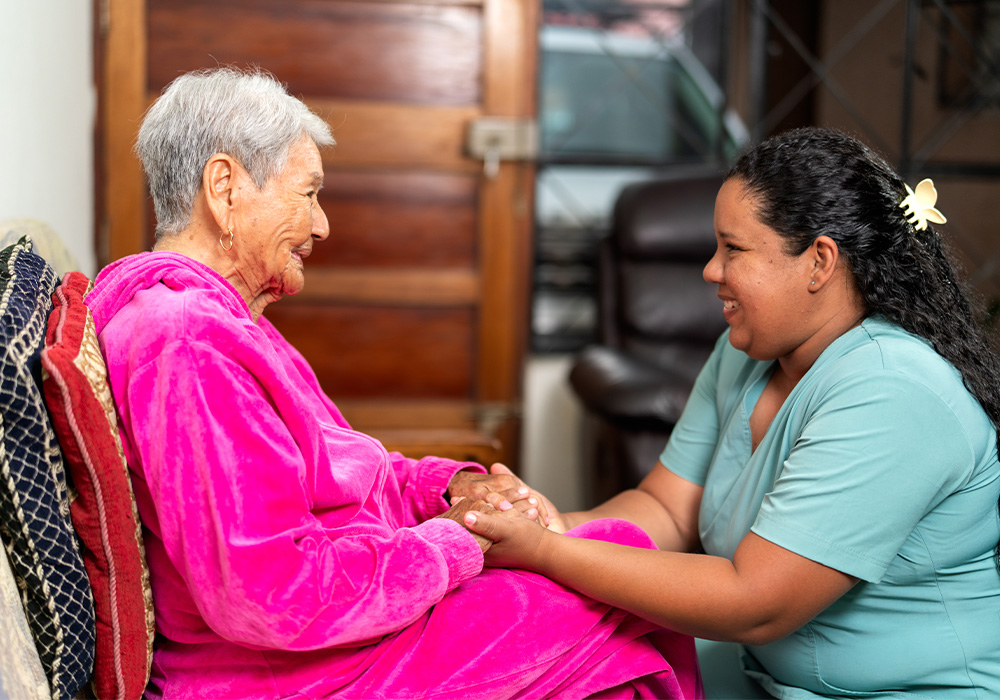Recognizing when a loved one needs extra support can be an emotional and often overwhelming experience for families. The desire to provide the best possible care while balancing personal responsibilities is a common challenge. However, being attuned to subtle changes in a senior’s daily life can offer clear indicators that it might be time for in-home care. This guide* aims to provide families with clear guidance, reassurance, and actionable next steps to ensure their loved one’s safety, well-being, and continued independence.
*Please note this does not replace advice from a medical professional.
Subtle Shifts: Early Indicators to Observe
Often, the signs aren’t sudden or dramatic. Instead, they appear as gradual changes in routine or behavior. Paying attention to these early indicators can help families proactively address needs before they become critical.
Changes in Personal Hygiene or Appearance
Is your loved one neglecting bathing, dressing, or grooming? Unkempt hair, soiled clothing, or a noticeable body odor can be red flags. This might signal difficulty with physical tasks or a decline in motivation.
Weight Loss or Poor Nutrition
Are meals being skipped? Is food expiring in the fridge, or are they relying heavily on pre-packaged, unhealthy options? Difficulty preparing meals, remembering to eat, or even swallowing can lead to malnutrition.
A Decline in Home Cleanliness
A previously tidy home becoming cluttered, dirty, or disorganized can indicate a struggle with routine household tasks, or even forgotten safety hazards like burnt pots on the stove.
Forgetfulness and Confusion
While occasional forgetfulness is normal, persistent memory lapses, confusion about time or place, or difficulty managing medications are significant concerns. This goes beyond misplacing keys to forgetting important appointments or instructions.
Clearer Calls: When Concerns Become More Apparent
As needs progress, the signs that it’s time for in-home care may become more pronounced and directly impact safety and independence.
Difficulty With Mobility or Balance
Increased shuffling, unsteadiness, or using furniture for support when walking are clear indicators. Falls, even minor ones, should never be dismissed. These can signal a need for assistance with walking, transferring, or even just getting up from a chair.
Unexplained Bruises or Injuries
These could be signs of unobserved falls or difficulty with daily tasks. It’s crucial to investigate the cause of such injuries.
Social Withdrawal or Isolation
A once-social senior becoming withdrawn from hobbies, friends, or family can point to struggles with transportation, mobility, or even depression. Loneliness has significant health impacts.
Challenges with Medication Management
Forgetting doses, taking incorrect amounts, or mixing up medications can have serious health consequences. This is a critical indicator that professional oversight is needed.
Increased Anxiety or Depression
Noticeable changes in mood, increased irritability, or persistent sadness could be linked to declining independence or unmet needs.
Finding Support With Caring for Family
Recognizing these signs is the first step; the next is finding appropriate support. It’s important to approach these conversations with your loved one with empathy and respect, focusing on their well-being and maintaining their dignity.
At the Caring for Family of Companies, we understand this journey. We offer a comprehensive suite of in-home care services designed to meet evolving needs, from personal care assistance and meal preparation to companionship, medication management, and specialized nursing services. Our compassionate Caregivers become an extended part of your family, providing not just physical support but also emotional reassurance and consistent monitoring.
Taking the Next Steps
If you’re observing these signs and wondering if it’s time for in-home care, reach out for a complimentary consultation. We can help assess your loved one’s unique situation, explain our personalized approach, and guide you through the next steps, ensuring they continue to live a life well-lived in the comfort and familiarity of their own home.
Contact your nearest branch today. Deep breath; you’re in good hands.

